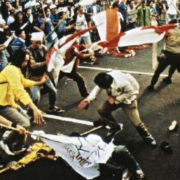
Criticism of Trump in Indonesia has been quite muted compared to the strong criticism of George W. Bush. Photo by Michael Vadon on Wikimedia Commons.
When US President Donald Trump came to power, there was widespread concern that the United States’ image in Muslim-majority Indonesia would fall to pre-Obama levels. Both during his campaign and as president, Trump has taken anti-Muslim prejudice to a new level for the United States. During the campaign, he surrounded himself with notoriously anti-Muslim advisors and made several apparently Islamophobic comments. Since taking office, he has twice issued executive orders banning immigration from a range of Muslim countries. While courts have blocked those orders, many have worried that his Islamophobic rhetoric could contribute to violence against, and stigmatisation of, Muslims.
Responding to these developments, Indonesian Vice President Jusuf Kalla suggested that although the immigration ban would not directly go against Indonesia’s interests, it might “fuel prejudice against Muslims in particular.” Foreign Minister Retno Marsudi said that Indonesia “has deep regrets about [Trump’s] policy”. Finance Minister Sri Mulyani Indrawati likewise expressed cautious concern about rising protectionism in the United States. Prominent members of civil society have also worried about the “post-truth politics” on which Trump built his success and the negative influence it may have on Indonesian democracy. Others worry that Trump’s rhetoric and policies will only prove the fundamentalists right in their claims that the west has always been involved in a kind of cultural war with the east, democracy is evil, and individual freedom is nothing but imperialist doctrine to brainwash society.
But it seems that many Indonesians do not share their views. Soon after Trump was elected, Gerindra lawmaker and long-time Trump admirer Fadli Zon said that the president’s anti-Muslim rhetoric was just a campaign strategy. He has been silent on the matter since. Coordinating Minister for Maritime Affairs Luhut Binsar Pandjaitan went even further, praising Trump as a “non-ideological and non-confrontational” leader who will regard Indonesia as a “democratic equal”. Hanura legislator Mukhtar Tompo recently said: ” I’m someone who is very happy with Donald Trump’s brilliant ideas and was glad to see him elected president.”
Why has criticism of Trump in Indonesia been so muted compared to the strong and almost uniform criticism directed at his Republican predecessor, President George W. Bush?
In the weeks following September 11, demonstrations against US policies toward Muslim countries were common in Indonesia. The Indonesian Council of Ulema (MUI) furiously claimed that the US attack on Afghanistan was an act of hostility and hatred toward Islam and called for jihad against the United States.
Since then, the US has been a popular scapegoat, often bearing the blame for incidents involving other western actors. During the Australian wiretapping scandal, for example, hundreds of members of Hizbut Tahrir Indonesia (HTI) and the Islamic Defenders Front (FPI) burnt US flags in a protest in front of the Australian Embassy in Jakarta. Protests often exploit anti-Jewish sentiment and refer to “antek-antek Amerika” (a derogatory term in Indonesia for US allies) in an attempt to reinforce the idea of Americans = westerners = foreigners = threat to Indonesia. This makes the absence of demonstrations against the US over the past few months all the more puzzling.
It is important to remember that when it comes to identity politics, cultural affinities (such as being Muslim) are not always coherent sources for action. Identity can hardly be described as static or complete. Simply looking at Indonesia as a “Muslim-majority country” is not sufficient to explain attitudes to the world beyond Indonesia’s borders.
One reason for the lack of strong public reaction or demonstrations against Trump and his policies in Indonesia is simply that many Indonesians are preoccupied with their own acute problems. For the past six months at least, they have been transfixed by the race for the Jakarta governor position and the blasphemy allegations against incumbent ethnic Chinese and Christian Governor Basuki “Ahok” Tjahaja Purnama. The movement of the hardline Islamic Defenders Front (FPI) to the centre of the political stage that has resulted has arguably damaged Indonesian Islam’s moderate image. The narrative of contention built by conservative Islamic groups has created “us-vs-them” divisions that have confused ordinary Indonesian citizens.
Framing Ahok as a threat to national unity, these groups have tried to connect the role played by international actors and anxieties about an open economy with Ahok. While notions of “imperialism” and “foreign exploitation” have usually been associated with the United States, anxiety is now being directed towards China. Ahok’s case has, in fact, been conflated with growing unrest about Chinese influence in Indonesia, especially in relation to the allegation that thousands, even millions, of Chinese workers have entered Indonesia, ready to exploit Indonesian land and defeat Indonesian workers in their own country. This sort of nativisim has occurred at the same time as Ahok’s policies of forced evictions across the capital. Both developments have provided room for groups like the FPI, and other political opponents of Ahok, to exploit the anger of the “little people” in Jakarta.
Past animosity toward the United States has been based on issues such as US involvement in the Israeli-Palestinian conflict, blasphemous statements about Islamic figures and teachings, and perceptions of foreign exploitation and imperialism. But Trump’s immigration and other policies related to nativism actually resonate in a strange way with the arguments put forward by conservative Islamic groups in Indonesia. They too want to restrict immigration, but in their case, immigration from China. Instead of the US, China is now the significant other.
In other words, Trump’s immigration and protectionist policies fit with Indonesian rhetoric about nationalistic development, even if they do target Muslims and run contrary to Indonesian interests.
In such circumstances, Trump’s business interests in Indonesia, a six star resort in Bali and a hotel in West Java, have hardly been discussed and his links to Indonesian politicians remain unquestioned.










